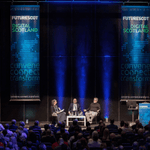Taking place on the 6th November, the annual Computer Weekly/Harvey Nash Diversity in Tech Conference 2025 once again brought together tech professionals from across the UK to explore what’s next for diversity, equity, and inclusion in technology, as well as celebrate Computer Weekly’s 50 Most Influential Women in UK Technology 2025.
The 2025 Lovelace Report revealed that over half of the women surveyed said their career progression hasn’t met expectations, and 60% found moving into leadership “very difficult”.
These findings set the tone for the event, prompting a deeper look at the structural barriers holding women back in the sector.
Understanding the data behind the divide
The day opened with Karen Blake, Co-Author of the ‘Lovelace Report’, who unpacked the data behind one of the most revealing studies into women’s experiences in tech. She shared that hundreds of women had reached out to her since the report’s release, saying it “tells their story”.
Karen highlighted several persistent challenges: that women are still less likely to receive “stretch assignments” or be trusted with high-profile projects that lead to progression. A lack of transparent career pathways and feedback structures further compounds the problem.
She also underlined the ongoing pay parity issue, with 15% of surveyed women citing unequal pay as a key reason for leaving their roles. When women are underpaid, Karen noted, it restricts their agency in major life decisions, from childcare to retirement planning. Combined with a lack of recognition and unclear career direction, these inequities often lead to burnout and ultimately push many talented women out of their roles and, too often, out of the sector altogether.
For the first time, the 2025 Lovelace Report quantifies the cost of this systemic failure, estimating that the UK tech industry loses between £2 billion and £3.5 billion each year due to women exiting the sector or churning between employers. This moves the conversation beyond diversity alone, making the case for retaining women in tech an urgent economic imperative.
Investing in female founders
From career progression to entrepreneurship, Sarah Turner, CEO and Co-Founder of Angel Academe, discussed how systemic barriers also affect women building and funding start-ups. Since 2014, her organisation has supported 56 female-founded tech companies through over 100 funding rounds, but she emphasised that the investment world remains largely “built by men, for men”.
Citing new UK data showing that female-founded businesses outperform male or mixed-gender teams, Sarah challenged the audience to “put some numbers on the cost of inaction”.
She also reflected on her own unconventional path, from studying history to working in systems analysis, encouraging young women to stay connected to STEM: “Even if you don’t want to code, you can do anything you want in the tech industry.”
Inspiring the next generation
For Emily Hall-Strutt, Director at Next Tech Girls, her path into tech was equally unplanned. After roles in retail and the Civil Service, she found her way into digital delivery, and soon realised how few women were around her.
That insight led her to help launch Next Tech Girls, an initiative that has now provided over 10,000 teenage girls across the UK with work experience in technology since 2022. Emily spoke passionately about the importance of reaching young women earlier: “We want them to choose tech, not fall into it by chance.”
Similarly, Francesca Caruso, Digital Product Manager at VodafoneThree, shared her unexpected journey from fashion school and retail management into product ownership. She described how being offered a digital production assistant role, after missing out on another job, became the turning point in her career, leading her to a series of digital roles and, ultimately, a senior product position.
Her story underscored a recurring theme of the day that opportunity often begins with visibility and support, even when careers take unconventional routes.
The power of networks and allyship
Nir Evron, AI Business Development Manager at ServiceNow UK&I, highlighted the often-overlooked role that networks play in career progression. He shared his own journey, explaining that the pivotal moments in his career didn’t happen because of the perfect CV or a specific set of skills, but because of the people who opened doors for him.
Nir spoke candidly about being overlooked earlier in his career and how he refused to let that limit him. Instead, he focused on building relationships and using his network as a source of support, sponsorship, and advocacy.
He also reflected on his time at Microsoft in 2022, when the company’s early backing of OpenAI pushed AI to the forefront of global conversation. It made him more aware of who was, and wasn’t, represented in those rooms. In sales teams in particular, he observed how women were frequently absent or overlooked, reinforcing why active allyship and sponsorship are critical.
His message was clear: leveraging your network isn’t something to shy away from; it’s an essential part of driving equity and ensuring that talent isn’t missed.
Becoming influential
A panel featuring Debbie Forster MBE, Akua Opong, Avril Chester, and Harvey Nash CEO Simon Crichton explored what it really means to be influential in tech.
Debbie Forster argued that influence isn’t about power, but about changing things and enabling others. Akua Opong spoke about striving to be a “beacon of light” for every student she meets, while Avril Chester encouraged bravery by speaking up even when it feels uncomfortable.
Simon Crichton highlighted how confidence gaps can hold women back, noting the stereotype that men apply for roles when they meet only half of the requirements, whereas women often wait until they meet nearly all. Something the panel agreed with.
The panel also discussed the value of mentorship, coaching, and sponsorship, urging attendees to seek clarity on which type of support they need and to build relationships based on trust.
On the emotional toll of advocacy, Debbie reminded attendees to “invest in yourself and know your value,” while Akua shared her own experiences of burnout and recovery and what keeps her going. She stressed the importance of staying visible and active in the industry: “If I leave, the young girls lose out.”
Confronting imposter syndrome
Closing the conference, Zoe Kleinman, Technology Editor at BBC News, addressed a common experience among women in tech, imposter syndrome.
Quoting author Reshma Saujani, Zoe noted that since 82% of women experience it, imposter syndrome isn’t a personal flaw but a societal issue. She shared her own experiences of overcoming bias and criticism, including being told early in her BBC career that her tone wasn’t suited to serious news.
Zoe’s message was one of resilience and visibility. She encouraged women to be proud of their work and let others see it, reminding the audience that visible role models play a vital role in inspiring the next generation.
Computer Weekly’s 50 Most Influential Women in UK Technology 2025
The conference closed with the announcement of Computer Weekly’s 50 Most Influential Women in UK Technology 2025, recognising those who continue to break barriers and inspire change across the sector.
This year’s top honour went to Naomi Timperley, Co-Founder of Tech North Advocates and Innovation Director at Oxford Innovation, who was celebrated for her long-standing contribution to supporting entrepreneurs and developing inclusive innovation networks.
Why events like this matter
The Diversity in Tech Conference continues to play a vital role in bringing together voices that challenge the status quo and inspire progress. It’s a reminder that while data can reveal inequality, it’s people, through shared experiences, advocacy, and action, who drive real change.
We’re proud to sponsor this event because creating space for honest conversations, visible role models, and practical action is essential to driving lasting change in our industry. Supporting this platform reflects our commitment to championing gender equity and ensuring every person in tech has the opportunity to thrive.
Our thanks go to all the speakers who shared their stories with honesty and passion, and to every attendee who joined the conversation. Together, we’re helping to build a more inclusive, equitable, and representative tech industry for the future.



